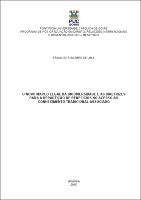| Compartilhamento |


|
Use este identificador para citar ou linkar para este item:
http://tede2.pucgoias.edu.br:8080/handle/tede/3443Registro completo de metadados
| Campo DC | Valor | Idioma |
|---|---|---|
| dc.creator | Lima, Francisca Soares de | - |
| dc.creator.Lattes | http://lattes.cnpq.br/1622630448462653 | eng |
| dc.contributor.advisor1 | Araújo, Luciane Martins de | - |
| dc.contributor.advisor1Lattes | http://lattes.cnpq.br/7050443999941260 | eng |
| dc.contributor.referee1 | Guimarães, Rejaine Silva | - |
| dc.contributor.referee1Lattes | http://lattes.cnpq.br/2926559239072928 | eng |
| dc.contributor.referee2 | Silva, José Antonio Tietzmann e | - |
| dc.contributor.referee2Lattes | http://lattes.cnpq.br/4585004100005242 | eng |
| dc.date.accessioned | 2016-09-02T12:49:49Z | - |
| dc.date.issued | 2015-12-14 | - |
| dc.identifier.citation | Lima, Francisca Soares de. O NOVO MARCO LEGAL DA BIODIVERSIDADE E AS DIRETRIZES PARA A REPARTIÇÃO DE BENEFÍCIOS NO ACESSO AO CONHECIMENTO TRADICIONAL ASSOCIADO.. 2015. 80 f. Dissertação( Programa de Pós-Graduação STRICTO SENSU em Direito, Relações Internacionais e Desenvolvimento) - Pontifícia Universidade Católica de Goiás, Goiânia - GO. | eng |
| dc.identifier.uri | http://localhost:8080/tede/handle/tede/3443 | - |
| dc.description.resumo | O objetivo do presente trabalho foi estudar a repartição de benefícios decorrentes do acesso ao conhecimento tradicional associado ao patrimônio genético, após a edição da Lei 13.123, de 20 de maio de 2015, conhecida como o Novo Marco Legal da Biodiversidade. O crescimento internacional das questões ligadas ao tema e situação do Brasil, como país detentor de relevante biodiversidade, justificam a realização do trabalho. Pretendeu-se verificar se as disposições da nova norma promovem uma repartição de benefícios entre provedores e usuários, de forma justa e equitativa, como estabelecem a Convenção de Diversidade Biológica e o Protocolo de Nagoya. Para atingir esse objetivo abordamos inicialmente o surgimento a nível internacional da ideia de proteção da biodiversidade. Proteção intentada, sem sucesso, por intermédio dos direitos de propriedade intelectual. Necessariamente nos reportamos às determinações da CDB e do Protocolo de Nagoya, ícones mundiais da proteção da biodiversidade. Retomando a questão no cenário nacional elencamos as disposições da legislação nacional, enfrentando os principais gargalos da norma regulamentadora, vigente até a aprovação da nova lei. À título de ilustração levantamos alguns casos de desrespeito da legislação por parte de empresas utilizadoras de conhecimento tradicional associado, em detrimento dos povos indígenas, comunidades e agricultores tradicionais. Por fim, analisamos as disposições da nova lei, especialmente dos itens voltados à questão ligada à repartição de benefícios, sendo possível concluir, a priori, pela ausência de legitimidade e de efetividade da lei, no que se refere à repartição de benefícios. | eng |
| dc.description.abstract | This study is to show the sharing of benefits due to access to traditional knowledge associated with genetic resources, after Law 13.123, of May 20, 2015, known as the New legal Mark of Biodiversity. The international growth of the issues related to the theme and situation of Brazil as a country holder of relevant biodiversity, justify the study done. It was intended to verify if the new standard promotes the sharing of benefits between providers and users in a fair and equitable manner as stipulated in the Convention on Biological Diversity and the Nagoya Protocol. To achieve this goal we initially approached the international Biodiversity protection idea. Protection brought unsuccessfully by means of intellectual property rights. Necessarily we refer to the DBC determinations and the Nagoya Protocol, world icons of biodiversity protection. Taking up the issue on the national scene we list the provisions of national law, facing the main problems of the regulation in force until the approval of the new law. We discuss some cases of disrespect of the law by companies using traditional knowledge associated to the detriment of indigenous peoples, communities and traditional farmers. Finally, we analyze the provisions of the new law, especially the items focused on allocation of benefits, being possible to conclude, by the lack of legitimacy and effectiveness of the law, as regards the sharing of benefits. | eng |
| dc.description.provenance | Submitted by admin tede ([email protected]) on 2016-09-02T12:49:49Z No. of bitstreams: 1 FRANCISCA SOARES DE LIMA.pdf: 746819 bytes, checksum: 5b9d227536e06f00abf741dd03875c94 (MD5) | eng |
| dc.description.provenance | Made available in DSpace on 2016-09-02T12:49:49Z (GMT). No. of bitstreams: 1 FRANCISCA SOARES DE LIMA.pdf: 746819 bytes, checksum: 5b9d227536e06f00abf741dd03875c94 (MD5) Previous issue date: 2015-12-14 | eng |
| dc.format | application/pdf | * |
| dc.thumbnail.url | http://localhost:8080/tede/retrieve/10175/FRANCISCA%20SOARES%20DE%20LIMA.pdf.jpg | * |
| dc.language | por | eng |
| dc.publisher | Pontifícia Universidade Católica de Goiás | eng |
| dc.publisher.department | Escola de Direito e Relações Internacionais::Curso de Direito | eng |
| dc.publisher.country | Brasil | eng |
| dc.publisher.initials | PUC Goiás | eng |
| dc.publisher.program | Programa de Pós-Graduação STRICTO SENSU em Direito, Relações Internacionais e Desenvolvimento | eng |
| dc.rights | Acesso Aberto | - |
| dc.subject | Meio ambiente; Biodiversidade; Conhecimento tradicional associado; Repartição de benefícios, Ciência e tecnologia; Agricultura; Lei nº 13.123, de 20 de maio de 2015. | por |
| dc.subject | Environment; Biodiversity; Associated traditional knowledge; Agriculture; Benefit sharing; Law 13.123, of May 20, 2015; | eng |
| dc.subject.cnpq | CIENCIAS SOCIAIS APLICADAS::DIREITO | eng |
| dc.title | O NOVO MARCO LEGAL DA BIODIVERSIDADE E AS DIRETRIZES PARA A REPARTIÇÃO DE BENEFÍCIOS NO ACESSO AO CONHECIMENTO TRADICIONAL ASSOCIADO. | eng |
| dc.type | Dissertação | eng |
| Aparece nas coleções: | Mestrado em Direito, Relações Internacionais e Desenvolvimento | |
Arquivos associados a este item:
| Arquivo | Descrição | Tamanho | Formato | |
|---|---|---|---|---|
| FRANCISCA SOARES DE LIMA.pdf | Texto Completo | 729,32 kB | Adobe PDF |  Baixar/Abrir Pré-Visualizar |
Os itens no repositório estão protegidos por copyright, com todos os direitos reservados, salvo quando é indicado o contrário.




